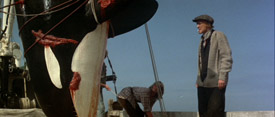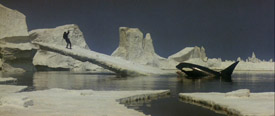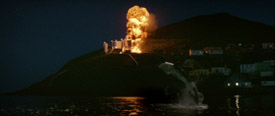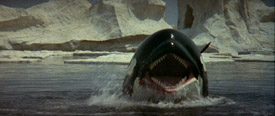| Reviews & Columns |
|
Reviews DVD TV on DVD Blu-ray 4K UHD International DVDs In Theaters Reviews by Studio Video Games Features Collector Series DVDs Easter Egg Database Interviews DVD Talk Radio Feature Articles Columns Anime Talk DVD Savant Horror DVDs The M.O.D. Squad Art House HD Talk Silent DVD
|
DVD Talk Forum |
|
|
| Resources |
|
DVD Price Search Customer Service #'s RCE Info Links |
|
Columns
|
|
|
Orca: The Killer Whale
Paramount // PG // September 14, 2004
List Price: $14.99 [Buy now and save at Amazon]
 Steven Spielberg's Jaws was an unprecedented success in the summer of 1975, the first movie to break the $100 million dollar mark at the box office and ushering in the age of the summer blockbuster. Numerous imitators soon followed in its wake, such as Piranha, Tentacles, and, as you probably guessed from the big, bold text above, Orca: The Killer Whale. The movie stars Richard Harris as Captain Nolan, a fisherman scheming to bring in a great white shark to the tune of a quarter million dollars. His prey comes dangerously close to chomping down on a nearby diver, frigid marine biologist Rachel Bedford (Charlotte Rampling), but a killer whale swoops in to save the day. This inspires Nolan to try to capture one of the whales, which would surely carry a pretty hefty price tag. Rachel strongly advises him against it, certain that he'd be unsuccessful but fearful that he might butcher several of the creatures in the process. Sure enough, Nolan's harpoon nicks the fin of the male he was eyeing and plunges into the whale's mate instead. The ship's crew, including one member played by Bo Derek in her film debut, is horrified at how horribly awry everything goes, but Nolan tries in vain to salvage something out of the chaos. The vengeful mate hunts down Nolan, systematically killing every member of his crew and decimating the tiny Newfoundland fishing town nearby. Eventually Nolan is forced to try to destroy the killer whale, and the quest that follows drives him to the brink of madness.
Steven Spielberg's Jaws was an unprecedented success in the summer of 1975, the first movie to break the $100 million dollar mark at the box office and ushering in the age of the summer blockbuster. Numerous imitators soon followed in its wake, such as Piranha, Tentacles, and, as you probably guessed from the big, bold text above, Orca: The Killer Whale. The movie stars Richard Harris as Captain Nolan, a fisherman scheming to bring in a great white shark to the tune of a quarter million dollars. His prey comes dangerously close to chomping down on a nearby diver, frigid marine biologist Rachel Bedford (Charlotte Rampling), but a killer whale swoops in to save the day. This inspires Nolan to try to capture one of the whales, which would surely carry a pretty hefty price tag. Rachel strongly advises him against it, certain that he'd be unsuccessful but fearful that he might butcher several of the creatures in the process. Sure enough, Nolan's harpoon nicks the fin of the male he was eyeing and plunges into the whale's mate instead. The ship's crew, including one member played by Bo Derek in her film debut, is horrified at how horribly awry everything goes, but Nolan tries in vain to salvage something out of the chaos. The vengeful mate hunts down Nolan, systematically killing every member of his crew and decimating the tiny Newfoundland fishing town nearby. Eventually Nolan is forced to try to destroy the killer whale, and the quest that follows drives him to the brink of madness. Orca was released two years after Jaws, and it isn't timid about wearing its inspiration on its sleeve. Both movies star a mammoth sea creature tearing a sleepy ocean town apart, their ominous fins serving as a harbinger of the destruction to come. They each feature a quest to the middle of nowhere to hunt the beast, and Jaws and Orca both include a scene where a crew member slips down the boards of a sinking ship into the toothy maw lurking below. Orca isn't content with merely aping Jaws and attempts to one-up it. Taking somewhat of a similar approach as Ape a year earlier, the movie opens with a whale ramming into a great white shark, killing it with that single blow. The beast is also more destructive -- the shark in Jaws ripped apart a dock, but this killer whale tears down an entire house and destroys what looks to be an oil refinery. As much of an inspiration as Jaws clearly was, Orca owes just as much to another well-known work that's embedded itself in popular culture. Moby Dick is referenced throughout the movie, and there are obvious similarities -- a whale is responsible for the loss of a leg, an Indian is among the members of the ship's crew, and, of course, there's a crazed captain hellbent on hunting the whale to the death. Instead of marching in lockstep down the same path as Moby Dick, the roles are almost reversed. The captain is the butcher who incites the whale to seek revenge rather than the other way around. This changes as the film's climax approaches, but it's a more interesting spin than mindlessly lifting pages from Melville's novel.
 The most memorable sequence is Nolan's initial attack on the whale -- its pained, blood-gushing reaction, its attempt at killing itself by rushing head-on into the ship's propeller, and the miscarriage when the defeated beast is hoisted onto the ship. It's brutal to watch, and even though nothing that happens in the movie after that point lives up to those moments, these few minutes almost singlehandedly redeem the film. Much of what happens afterwards is irrepressibly silly but still occasionally gets the desired reaction, such as a killer whale setting into motion a series of explosions on the mainland or wolfing down half of Bo Derek's leg, cast and all. Nolan is also frequently given advice, or at least vague mumblings intended to bear a passing resemblance to advice, by a supposedly wise Indian who talks quite a bit but rarely manages to say anything at all. I could double the length of this review by ranting about the over-the-top climax set atop the styrofoam icefloes of your grocer's freezer, but I'll let the screengrab speak for me.
The most memorable sequence is Nolan's initial attack on the whale -- its pained, blood-gushing reaction, its attempt at killing itself by rushing head-on into the ship's propeller, and the miscarriage when the defeated beast is hoisted onto the ship. It's brutal to watch, and even though nothing that happens in the movie after that point lives up to those moments, these few minutes almost singlehandedly redeem the film. Much of what happens afterwards is irrepressibly silly but still occasionally gets the desired reaction, such as a killer whale setting into motion a series of explosions on the mainland or wolfing down half of Bo Derek's leg, cast and all. Nolan is also frequently given advice, or at least vague mumblings intended to bear a passing resemblance to advice, by a supposedly wise Indian who talks quite a bit but rarely manages to say anything at all. I could double the length of this review by ranting about the over-the-top climax set atop the styrofoam icefloes of your grocer's freezer, but I'll let the screengrab speak for me. Richard Harris tackles his role well, and it's the meatiest of the lot. Nolan isn't a moustache-twitching fiend -- he's arrogant, and his actions warrant the sort of violent response he receives, but he's not painted as a single-minded, destructive monster. Nolan certainly isn't the hero of the piece, but at least in my eyes, he's not clearly the villain either. Orca also benefits from the use of real killer whales in the film. Unfortunately, it's painfully obvious that some of the underwater footage was shot in a murky tank somewhere, and the editing pays little regard to the way those shots match up with the material surrounding them. The end result has some really spectacular footage quickly followed by a dingy, barely-discernable shot of an amorphous, monochromatic blob careening across a dark blue screen. The presumably mechanical creature that interacts with the cast looks pretty convincing to me, which makes for an interesting contrast in the finale where the icy surroundings look flat-out ridiculous.
 The pedigree of some of the talent behind the camera is worth noting as well. Director Michael Anderson had just come off Logan's Run and would helm a television miniseries based on Ray Bradbury's The Martian Chronicles shortly thereafter. Writers Luciano Vincenzoni and Sergio Donati had both worked under famed Italian director Sergio Leone at varying times, with For a Few Dollars More and The Good, The Bad, and The Ugly among their credits. Also no stranger to collaborating with Leone is the immeasurably talented composer Ennio Morricone, who I sincerely hope played no part in the warbling female vocals that run over the movie's end credits.
The pedigree of some of the talent behind the camera is worth noting as well. Director Michael Anderson had just come off Logan's Run and would helm a television miniseries based on Ray Bradbury's The Martian Chronicles shortly thereafter. Writers Luciano Vincenzoni and Sergio Donati had both worked under famed Italian director Sergio Leone at varying times, with For a Few Dollars More and The Good, The Bad, and The Ugly among their credits. Also no stranger to collaborating with Leone is the immeasurably talented composer Ennio Morricone, who I sincerely hope played no part in the warbling female vocals that run over the movie's end credits. Despite its occasionally sluggish pacing and giant leaps in logic, Orca: The Killer Whale has enough entertaining moments to make it one of the better Jaws knockoffs of the late '70s. Paramount Home Video is releasing the movie on a budget-minded DVD with anamorphic widescreen video, its original mono audio, and little else worth noting.
 Video: Shot in Panavision and exhibited theatrically at an aspect ratio of 2.35:1, Orca has been most widely seen over the past quarter-century or so in a heavily cropped form. This DVD preserves the movie's intended framing in anamorphic widescreen, and for the most part, it looks fantastic. A few scattered shots appear exceptionally grainy, and the last reel is in considerably worse shape than the rest of the film. Other than that, there are no complaints of note. Speckling is light, and there are no nicks, tears, compression artifacts, or edge haloes to fret over. Black levels are rock solid, and colors appear to be accurately saturated. Some of the footage, particularly the early shots of the whales leaping out of the water on a sunny afternoon, certainly don't look as if they were filmed nearly three decades ago. The quality is somewhat inconsistent, especially near the end, and the occasionally sloppy, unconvincing photography doesn't help matters any, but it's overall very well-done.
Video: Shot in Panavision and exhibited theatrically at an aspect ratio of 2.35:1, Orca has been most widely seen over the past quarter-century or so in a heavily cropped form. This DVD preserves the movie's intended framing in anamorphic widescreen, and for the most part, it looks fantastic. A few scattered shots appear exceptionally grainy, and the last reel is in considerably worse shape than the rest of the film. Other than that, there are no complaints of note. Speckling is light, and there are no nicks, tears, compression artifacts, or edge haloes to fret over. Black levels are rock solid, and colors appear to be accurately saturated. Some of the footage, particularly the early shots of the whales leaping out of the water on a sunny afternoon, certainly don't look as if they were filmed nearly three decades ago. The quality is somewhat inconsistent, especially near the end, and the occasionally sloppy, unconvincing photography doesn't help matters any, but it's overall very well-done. Audio: Orca is presented in Dolby Digital mono, encoded at a bitrate of 192Kbps. It's a decent, if unimpressive, track: dialogue comes through reasonably clearly, and sound effects such as the whale's incessant ramming and some explosions from the havoc he wreaks are strong and robust. Morricone's forgettable score sounds thin, not roaring from my center speaker the way I was expecting. Strictly average. Orca also offers English subtitles and closed captions.
Supplements: There are no extras. The disc is packaged in a keepcase, and an insert is not provided. The DVD includes a set of static 16x9 menus and eleven chapter stops.
Conclusion: Orca: The Killer Whale doesn't come close to approaching the heights of a near-flawless film like Jaws, but it is one of the better knockoffs to emerge in the wake of Jaws' success. The movie hasn't been lavished with the special edition treatment on DVD, but the anamorphic widescreen presentation looks great, and the bargain basement sticker price makes a purchase more palatable than it would've been at a higher price point.
|
| Popular Reviews |
| Sponsored Links |
|
|
| Sponsored Links |
|
|
| Release List | Reviews | Shop | Newsletter | Forum | DVD Giveaways | Blu-Ray | Advertise |
|
Copyright 2024 DVDTalk.com All Rights Reserved. Legal Info, Privacy Policy, Terms of Use,
Manage Preferences,
Your Privacy Choices | |||||||













